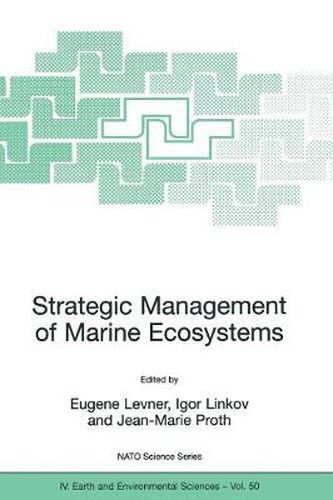Readings Newsletter
Become a Readings Member to make your shopping experience even easier.
Sign in or sign up for free!
You’re not far away from qualifying for FREE standard shipping within Australia
You’ve qualified for FREE standard shipping within Australia
The cart is loading…






This title is printed to order. This book may have been self-published. If so, we cannot guarantee the quality of the content. In the main most books will have gone through the editing process however some may not. We therefore suggest that you be aware of this before ordering this book. If in doubt check either the author or publisher’s details as we are unable to accept any returns unless they are faulty. Please contact us if you have any questions.
The demand for advanced management methods and tools for marine ecosystems is increasing worldwide. Today, many marine ecosystems are significantly affected by disastrous pollution from industrial, agricultural, municipal, transportational, and other anthropogenic sources. The issues of environmental integrity are especially acute in the Mediterranean and Red Sea basins, the cradle of modern civilization. The drying of the Dead Sea is one of the most vivid examples of environmental disintegration with severe negative consequences on the ecology, industry, and wildlife in the area. Strategic management and coordination of international remedial and restoration efforts is required to improve environmental conditions of marine ecosystems in the Middle East as well as in other areas. The NATO Advanced Study Institute (ASI) held in Nice in October 2003 was designed to: (1) provide a discussion forum for the latest developments in the field of environmentally-conscious strategic management of marine environments, and (2) integrate expertise of ecologists, biologists, economists, and managers from European, American, Canadian, Russian, and Israeli organizations in developing a framework for strategic management of marine ecosystems. The ASI addressed the following issues: Key environmental management problems in exploited marine ecosystems; Measuring and monitoring of municipal, industrial, and agricultural effluents; Global contamination of seawaters and required remedial efforts; Supply Chain Management approach for strategic coastal zones management and planning; Development of environmentally friendly technologies for coastal zone development; Modeling for sustainable aquaculture; and Social, political, and economic challenges in marine ecosystem management.
$9.00 standard shipping within Australia
FREE standard shipping within Australia for orders over $100.00
Express & International shipping calculated at checkout
This title is printed to order. This book may have been self-published. If so, we cannot guarantee the quality of the content. In the main most books will have gone through the editing process however some may not. We therefore suggest that you be aware of this before ordering this book. If in doubt check either the author or publisher’s details as we are unable to accept any returns unless they are faulty. Please contact us if you have any questions.
The demand for advanced management methods and tools for marine ecosystems is increasing worldwide. Today, many marine ecosystems are significantly affected by disastrous pollution from industrial, agricultural, municipal, transportational, and other anthropogenic sources. The issues of environmental integrity are especially acute in the Mediterranean and Red Sea basins, the cradle of modern civilization. The drying of the Dead Sea is one of the most vivid examples of environmental disintegration with severe negative consequences on the ecology, industry, and wildlife in the area. Strategic management and coordination of international remedial and restoration efforts is required to improve environmental conditions of marine ecosystems in the Middle East as well as in other areas. The NATO Advanced Study Institute (ASI) held in Nice in October 2003 was designed to: (1) provide a discussion forum for the latest developments in the field of environmentally-conscious strategic management of marine environments, and (2) integrate expertise of ecologists, biologists, economists, and managers from European, American, Canadian, Russian, and Israeli organizations in developing a framework for strategic management of marine ecosystems. The ASI addressed the following issues: Key environmental management problems in exploited marine ecosystems; Measuring and monitoring of municipal, industrial, and agricultural effluents; Global contamination of seawaters and required remedial efforts; Supply Chain Management approach for strategic coastal zones management and planning; Development of environmentally friendly technologies for coastal zone development; Modeling for sustainable aquaculture; and Social, political, and economic challenges in marine ecosystem management.